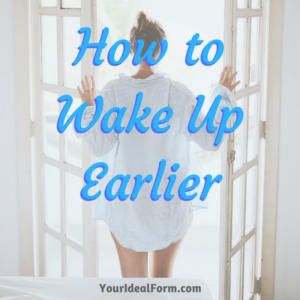
Our saga of Jane and her quest to get up earlier so she has time to workout and get more done in her day continues. Jane set up a nightly routine and is now getting much better sleep, but her sleep has gotten so good, she has a really hard time getting out of bed in the mornings. Here are some suggestions to help you actually get out of bed earlier.
Go to bed earlier
Set an alarm at night so that you know to start prepping for bed and don’t lose track of the time. Be sure to give yourself time to do your nightly routine which will help you fall asleep faster! It’s really hard to get up early if you haven’t had enough sleep.
Wake up at the same time each day
This one is tough, especially on weekends. But waking up the same time each day gets your body into a routine, and our bodies love routines. This helps in two ways: one, it teaches the body what time to wake up, so you start to naturally wake up at that time, even without an alarm; and two, it also makes you start feeling sleepy at the time your body needs to go to bed in order to get the optimal amount of sleep. How much sleep you need is different for everyone, but if you make it a habit to wake up at the same time each day, your body will let you know when it’s bedtime!
Avoid hitting snooze
The snooze button is insidious. It seems like your friend, but it’s really not. You aren’t going to be able to get any quality sleep between when you hit that button and when the alarm goes off again, so you might as well just get up. Also, going in and out of sleep like that lengthens your “sleep inertia” making it harder for you to fully wake up and be alert enough to get on with your day. Another option is using an alarm app like the Rock Clock which has no snooze function at all, so you have no choice but to get up. (Also, who doesn’t love The Rock?)
Try an alarm clock hack
To avoid that snooze button, try moving your alarm clock to the other side of the room. This requires that you actually get up to turn it off. You can also get an alarm clock app for your phone that is trickier to turn off, such as one that requires that you solve a math problem (or several) before it will turn off. That forces you to get your brain working and gets you to “wake up” before turning the alarm off. Another helpful tip is to use an alarm clock app that works with your body’s sleep rhythms to wake you when it thinks you are at the lightest part of your sleep cycle. The idea here is that instead of shocking you out of a deep sleep, the app monitors your movement patterns (requires that your phone be under your pillow or on your mattress somewhere) and will wake you up anywhere up to half an hour before your “must be awake” time based on how much you are moving about. More movement = lighter sleep and thus not as much of a shock to wake up.
Get a sunrise alarm clock
Just as it was important to darken our bedrooms to prepare our bodies natural rhythms for sleep, having some natural light in the mornings can help to wake us up. Getting an alarm clock that has a sunrise feature can help bring you out of sleep slowly, while also signaling to your body that it is time to be up and about. This is especially important the further you live from the equator, as in winter time, it can stay dark out for a long time, and you need that fake sun to help you get going. Some of these lights can even do double duty as light therapy for Seasonal Affective Disorder. (For more ways to combat SAD, check out this infographic over at Positive Health Wellness)
Try feeding pets earlier
Not guaranteed to work, especially if you have pets that are content to cuddle. That said, try feeding your pets earlier. Once they get used to a routine of eating at a certain time, they’ll start waking you up expecting their breakfast. And how can you say “no” to that face?
Now that you’re up, let’s make sure you start this day off on the right foot!